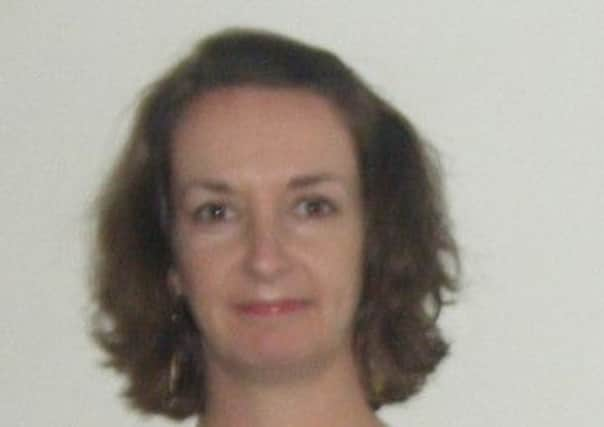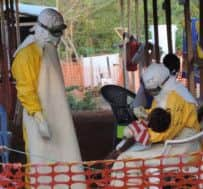Ebola nurse tells of her ordeal after being discharged from hospital


In an exclusive interview with Scotland on Sunday, a sister title of The Yorkshire Post, before she left the Royal Free Hospital in London, Cafferkey admitted that at her lowest point she believed she would die and told her doctors: “That’s it. I’ve had enough. I can’t carry on any more.”
But yesterday as she prepared to return home to her family in Cambuslang in Scotland, the 39-year-old community nurse said she was “very happy to be alive”.
Advertisement
Hide AdAdvertisement
Hide AdClutching a Saltire signed by members of the medical team who have cared for her since she was admitted to the high-level isolation unit on 30 December, Cafferkey listed the things she was looking forward to, including a bath – “I haven’t had one for some time now” – and vegetarian Chinese food. “I just want to get back to normal life,” she said.


Although doctors have declared her free of the Ebola virus, which has claimed the lives of more than 8,000 victims in West Africa, Cafferkey still faces a long journey to regain her strength. In hospital, cocooned within an isolation tent, she relied on a diet of Irn-Bru, Sugar Puffs and listening to The Archers to help her through her life-threatening ordeal.
She also spoke of the healing power of a piece of classical music – Peer Gynt by Edvard Grieg – that she listened to during her recovery.
Yesterday a smiling but frail Cafferkey spoke movingly about the events that led to her being rushed from hospital in Glasgow to the Royal Free, which has the only specialist unit in the UK equipped to handle cases of the potentially fatal virus.
Advertisement
Hide AdAdvertisement
Hide AdCafferkey was one of 30 NHS medical volunteers from the UK who travelled to Sierra Leone last November to work at a Save the Children hospital in the highly infectious “red zone” just outside the capital, Freetown.
After four weeks on the frontline in the battle against Ebola, Cafferkey flew back to London via Casablanca. She then caught a flight to Glasgow.
“I felt fine throughout the whole journey. It wasn’t until I got home that I started to get the shivers,” she said. “We were all given thermometers when we got back and I took my temperature but thought it might be a urine infection or something like that.
“I contacted the Brownlee Centre in Glasgow and told them I felt unwell. I got taken to the Brownlee Centre by ambulance and had my blood taken. They were aware where I had travelled from.
‘I’ve got a fight on my hands’
Advertisement
Hide AdAdvertisement
Hide Ad“I had a lovely doctor in Glasgow who had the horrible job of breaking the news to me that I had Ebola. I just said, ‘I’ve got a fight on my hands,’ as I knew what potentially could happen to me and did happen to me.
“It wasn’t a shock to me, and being a nurse helped.”
She added: “Obviously it crossed my mind how I caught it, but I’ve no idea. I never went to church on Christmas Day. I never worked on Christmas Day.
“I didn’t get steadily worse and I was fine for the first two or three days and couldn’t understand what all the fuss was about, but then I did deteriorate.”
On 3 January the hospital issued a brief statement on their website announcing that Cafferkey’s condition had gradually deteriorated over the past two days and she was now critically ill. While she received round-the-clock care, her worried family could only watch her suffering from outside the isolation unit.
Advertisement
Hide AdAdvertisement
Hide AdIt was at this point that First Minister Nicola Sturgeon, Prime Minister David Cameron and Health Secretary Jeremy Hunt sent their messages of support to the care worker who had put her life at risk to help others.
Cafferkey said yesterday that during her worst days she wasn’t in a coma but was semi-conscious as doctors fought to save her.
She said: “I definitely wasn’t unconscious and my mind just blanked out what was happening to me.
“I was sick and on lots of medication – there was one point when there were one or two doctors around me and I said, ‘That’s it. I’ve had enough, I can’t carry on anymore’.
Advertisement
Hide AdAdvertisement
Hide Ad“My family weren’t allowed in, they could only get so far – there was a window they could look through but they weren’t with me.
“I thought I was fighting it, but at that point I said ‘I’ve had enough, it’s too much’.
‘I lost a week of my life’
“There were certain things I was in pain with. I had quite a nasty rash and touching my skin was painful, the nerves. It was extremely painful when I was touched and having my blood pressure taken was sheer agony.
“I had a central line taking my blood, so thankfully I didn’t need to get jagged all the time.
Advertisement
Hide AdAdvertisement
Hide Ad“I remember saying to my sister ‘I’ve been here a week now’ and she said, ‘No, it’s two weeks’ – so I lost a week of my life, although small snippets are coming back to me. I had no sense of time whatsoever.”
During that lost time, Cafferkey was treated with an experimental anti-virus drug, ZMabb, which was flown in from Canada, and blood plasma from survivors. The drug ZMapp, which was used to successfully treat another British Ebola sufferer, William Pooley, was unavailable.
Slowly, Cafferkey’s immune system began to fight back against the virus and she began to grow incrementally stronger. On 12 January the hospital announced she was no longer critical after a nine-day fight for life.
Dr Michael Jacobs, head of the infectious diseases team at the Royal Free, who was in charge of Cafferkey’s treatment, said yesterday: “We were clearly focused on giving Pauline the best possible care we could. But in the end it probably comes down to the fact that she had to cure herself. She used her own immune system, which has cleared the virus, but we’re very fortunate here to have specialist facilities.”